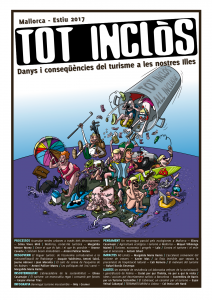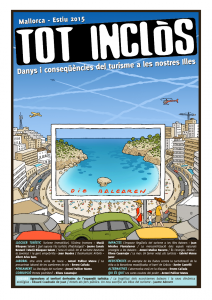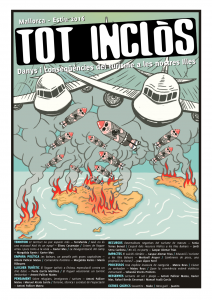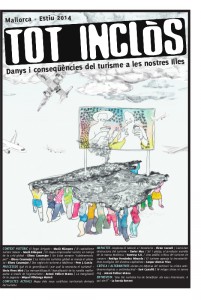Fighting against tourism is also battling the middle class’ values, which are the basis on which the modern capitalism is based.
I LOVE CAPITALISM
(…)
because all of us want to be
mild-mannered bourgeoises,
mortgage slaves
subscribed to the religion of owners’ individualism,
because nobody wants to be anything else,
nobody wants to fight with his/her own self
because
when the day comes, in which we want to fight with our own selves,
this day
the middle class
will burn.
Antonio Orihuela
Translator: David López de la Morena
The irruption of tourism as we know it is clearly related to the expansión and consolidation of the so-called middle-classes. It is not until after the post-World War age and until the establishment of the so-called welfare state, that the tourism industry begins its stunning expansion. Thus, it is in the countries that firstly develop this new social and economic order (Sweden, UK, the Federal Republic of Germany, etc) where the masses that will use the first big hotel blocks appear.

Family “made in capitalism”
As Ivan Murray and Joan Buades have very well researched, this first tourism industry expansion was driven by the political and economic guardianship of the USA in the old Europe. In the Spanish State, for instance, those guidelines (Economic Stabilization Plan) encourage the Francoism to make Spain becomes one of the main receivers of this emerging industry. This way, tourists that visit the coasts of the fascist Spain in the 60s, start already to be millions. On the other hand, during the same years, and in a brutal paradox, it starts the great emigration of Spanish people to European countries where tourists to a large extent come from (1.066.440 people emigrated to the European continent between 1959 and 1973, according to official data by the Spanish Institute for Emigration (IEE)). Besides that, it is in this same decade that the enormous rural exodus to the cities and also to the new touristic areas in the Mediterranean coast takes place (between 1961 and 1965, almost 2 million people left their villages behind1).
As we can see, the fact that the expansion of the tourism industry and the consolidation of the consumer society developed in parallel to the abandonment of the rural environment and the conversion of most of the working class into middle class did not happen just by chance. Nowadays there is much talk about the regression of this social class because of the economic crisis. What is however not much discussed, is the systems of ideas and values that this class has adopted, that constitute the base upon which the capitalism of modern times lies, and thus its top one industry nowadays: tourism.
Contemporary middle class’ ideology is roughly the heir to that of the petty bourgeoisie at the early years of the Industrial Revolution (proprietary right, security, devotion of progress, conservadurism, rejection of collectivism, etc). But its more respresentative traits would be adopted only after the trauma of World War II, given that from this apocalyptic fight a new world order surged, ruled by the USA on the one hand, and by the USSR on the other hand. Regarding the Western Bloc (that is whence the tourism of masses arises), it in general adopts politics of a social-democratic or keynessian appearance, which is seen by the elites as the best way to propel economy and also as the method to inactivate the threat of a proletarian revolution. During these years, working-classes obtain a better economic welfare and a series of social improvements, as paid holidays. But this raise in social status2 had to be directed by the adoption of a series of values and ideas that made possible that these social benefits would serve the interests of capitalism’s expansion. The powerful mass media industry would take charge of this task. This industry was expanding greatly in this time, thanks mostly to television, which would eventually be the star of the propaganda system that would constantly spread the alleged virtues related to the consumer society, as well as the ideology that had to be adopted. Therefore, having turned the working-class into an euphoric middle class, and having also created a new social figure as the holidays are; all the ingredients were almost cooked up to start serving the juicy plate tourism has always been for capitalism.
Besides that, other mechanisms of sociologic implications had been influencing to make the touristic experience something that is needed. In a predominantly urban society, with an individualist mindset, where life spins according to the steering wheel of alienating work (assembly lines, offices, service sector, etc), where boredom is in accordance with disorientation about what is the meaning of our own existence, stressed because one has to enjoy more, and where constantly we suffer the machine-gun attack from the factory of children’s dreams that is leisure industry and consumption; people need some break, some escape from reality. And what better to escape from this hostile reality than several days of breakout to be chosen among dozens of offers that the touristic sector has known how to create. Thus, nowadays the classic fugitive is able to choose among staying in a hotel on the beachfront, either in the traditional Mediterranean sea or in more exotic destinations as it could be the sands that surround the Caribbean sea or the sea of China.
On the other hand, the huge diversity of fugitives that the capitalism has created also has its own exclusive offer to escape: gastronomic, cultural, party, adventurous, anthropological, relaxing, rural, naturalist, residential, sporting, sexual, etc, etc.
This way, nevertheless, it is urgent to start fighting against tourism. But, if we cannot force people not to travel, not to escape, what can we do to start questioning tourism?
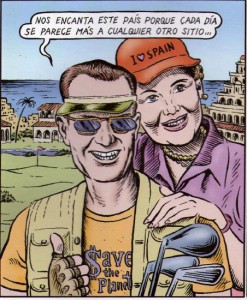
“We love this country because every day it looks more like anywhere else.” The System uniformizes thoughts and landscapes.
First of all, make people aware about the disastrous consequences on environment and on recipient communities that this industry causes. In this monograph and in the previous one we show relevant signs that can serve to make people start thinking seriously about this problems. This way, calling it into question, they will reach to the conclusion that the right to do tourism is a luxury3, given that only 25% of the population of the planet can enjoy this privilege. And all this happens when migratory processes (many of them related with wars, destruction and climate change) are becoming more and more important. Samely, they will understand its absolute unsustainability and its imposible generalization to the rest of mankind.
Finally, to counteract the need to escape and to consume sensations that comes with tourism, what can we set up against?
From the get-go, battling the individualist mindset and ideology4 that has been instilled in the so-called middle-classes. Against the “owner individualism” we have to offer the alternative of community, the virtues of life in community (fraternity, solidarity, mutual support, empowerment, etc); co-operation as the opposite of competitiveness, self-management against consumism of all kind, the virtues of culture against the blinders of ignorance, the person in opposition to the masses, responsibility against childish mentality; rural life against metropolitan life, international solidarity against petit bourgeois provincianism, own culture against globalized mass-culture, struggle against apathy, etc.
So, as the poet writes:
when the day comes, in which we want to fight with our own selves,
this day
the middle class
will burn.
1 Capel, H. (1967). Los estudios acerca de las migraciones interiores en España. Revista de Geografía, I, 1, pp. 79-101.
2 Oriented by another mentality it could have been possible to redirect these social improvements toward an empowerment in order to strengthen the fight against capitalism.
3 We can not firget that it is also thanks to the oil that the people can go and come back from places.
4 Biagini, C. (2012). La ideologia del adosado. Ekintza Zuzena, número 39.

